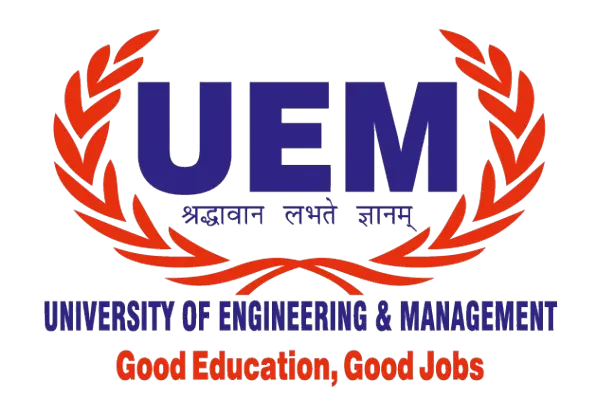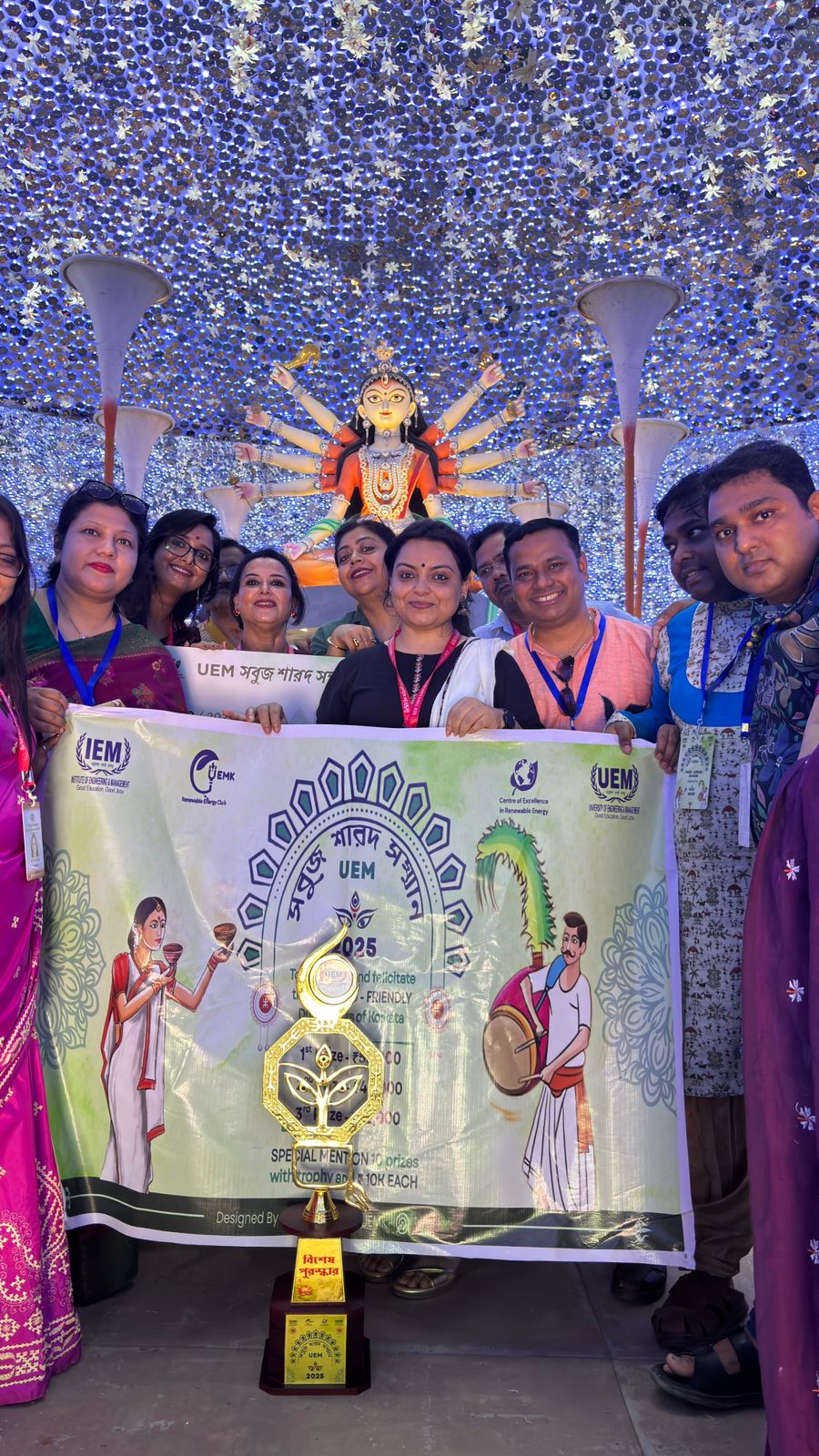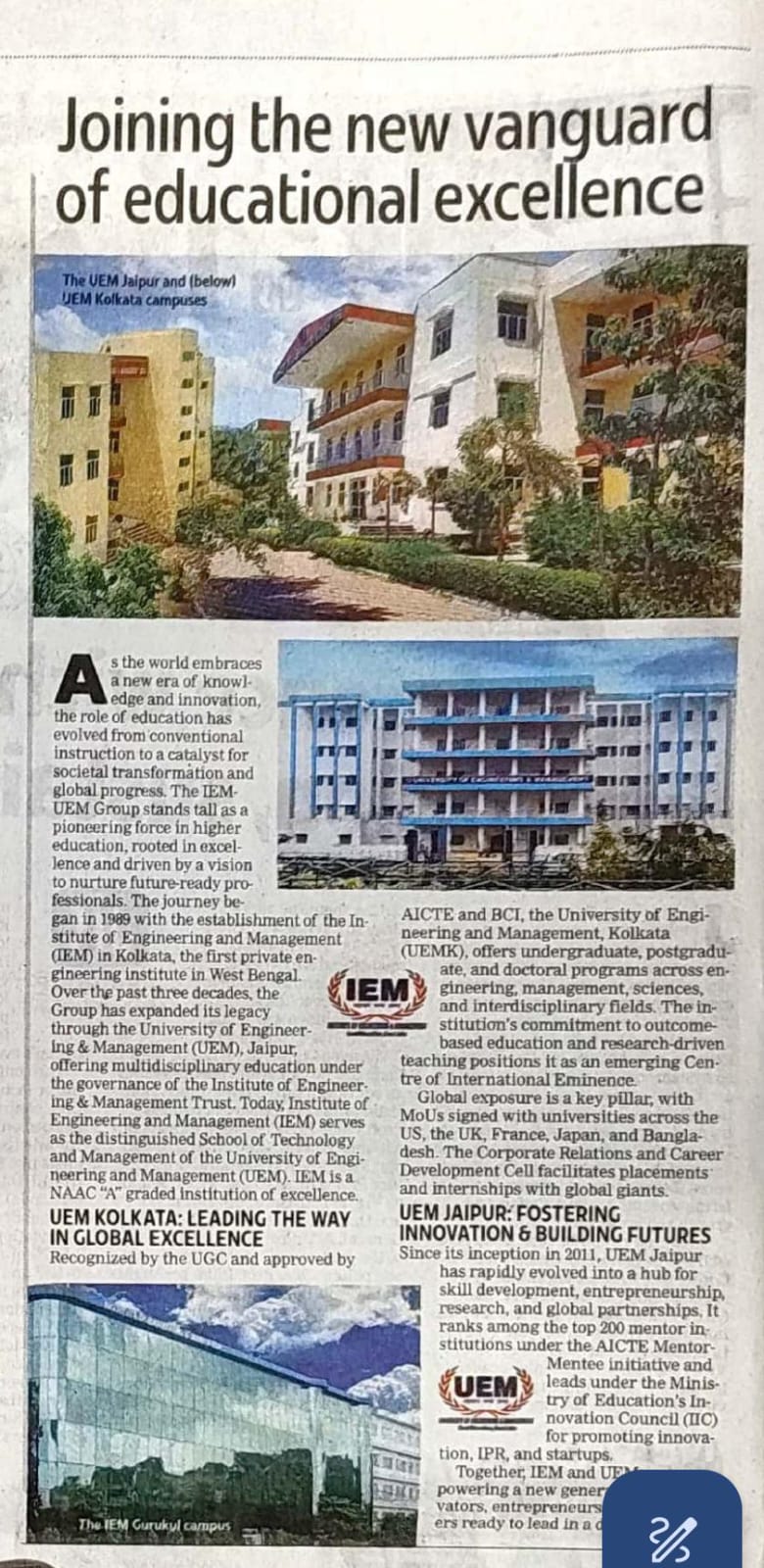University of Engineering and Management Kolkata
Department of Computer Science and Engineering (Artificial Intelligence and Machine Learning)
Overview
About Us
One of the newest and most cutting-edge engineering departments of the Institute of Engineering and Management, Newtown, is the Department of Computer Science & Engineering (Artificial Intelligence & Machine Learning), or CSE (AI & ML). It began operations in the academic year 2020–2021 and was founded under the auspices of the University of Engineering and Management, Kolkata. The main goal of this department is to teach fundamental ideas like computational thinking, object-oriented programming, data structures, algorithms, machine learning, deep learning, database management systems, artificial intelligence (including search strategies and knowledge representation), natural language processing, and Python programming for problem-solving. As a result, students will have a thorough understanding of artificial intelligence and machine learning through the application of real-world issues in a wide range of application domains, including speech and natural language processing, computer vision, cognitive sciences, and others. Throughout their studies, students will get expertise in a variety of professional electives given by machine learning, computer vision, voice and natural language processing, data analytics, cyber security, blockchain, cloud computing and generative AI domain verticals.
Vision of the Department
Our vision is to be the forerunner in AI and ML and to generate globally employable graduates with ethical principles who are dedicated to creating a thriving country.
Mission of the Department
- To make a consistent effort to establish and maintain an academic atmosphere that prioritizes research and publishing.
- To inculcate individuals with a solid understanding of artificial intelligence, machine learning, and computer science and engineering, both theoretically and practically
- To impart knowledge of artificial intelligence and data analysis to each student individually.
Program Educational Objectives
PEO 01: High Quality Engineering Design and Development Work Program graduates will use their skills in computer science and engineering to effectively identify and solve significant challenges in a variety of application areas.
PEO 02: Real Life Problem Solving To develop students’ skill in the fundamentals of computer science, engineering, and allied engineering fields so they can understand engineering trade-offs and analyze, design, and synthesize technical concepts and data to produce innovative products and solutions for real-world issues.
PEO 03: Leadership Program graduates will pursue lucrative careers in business and academics and rise to prominent positions where they can make a difference in their communities, businesses, and professions.
PEO 04: Lifelong Learning Graduates of the program will be able to adjust to modern tools, methods, and approaches in order to stay at the forefront of AI, ML and computer science and engineering practice and be ready to meet the demands of a demanding environment.
Program Outcomes(POs)
PO1: Engineering knowledge: Apply the knowledge of mathematics, science, engineering fundamentals, and an engineering specialization to the solution of complex engineering problems.
PO2: Problem analysis: Identify, formulate, research literature, and analyze complex engineering problems reaching substantiated conclusions using first principles of mathematics, natural sciences, and engineering sciences.
PO3: Design/Development of solutions: Design solutions for complex engineering problems and design system components or processes that meet the specified needs with appropriate consideration for the public health and safety, and the cultural, societal, and environmental considerations
PO4: Conduct investigations of complex problems: Use research-based knowledge and research methods including design of experiments, analysis and interpretation of data, and synthesis of the information to provide valid conclusions.
PO5: Modern tool usage: Create, select, and apply appropriate techniques, resources, and modern engineering and IT tools including prediction and modeling to complex engineering activities with an understanding of the limitations.
PO6: The engineer and society: Apply reasoning informed by the contextual knowledge to assess societal, health, safety, legal and cultural issues and the consequent responsibilities relevant to the professional engineering practice.
PO7: Environment and sustainability: Understand the impact of the professional engineering solutions in societal and environmental contexts, and demonstrate the knowledge of, and need for sustainable development.
PO8: Ethics: Apply ethical principles and commit to professional ethics and responsibilities and norms of the engineering practice.
PO9: Individual and team work: Function effectively as an individual, and as a member or leader in diverse teams, and in multidisciplinary settings.
PO10: Communication: Communicate effectively on complex engineering activities with the engineering community and with society at large, such as, being able to comprehend and write effective reports and design documentation, make effective presentations, and give and receive clear instructions.
PO11: Project management and finance: Demonstrate knowledge and understanding of the engineering and management principles and apply these to one’s own work, as a member and leader in a team, to manage projects and in multidisciplinary environments.
PO12: Life-long learning: Recognize the need for and have the preparation and ability to engage in independent and life-long learning in the broadest context of technological change.
Program Specific Outcomes (PSOs)
PSO1: Technical knowledge and analysis: Apprehend and analyze specific engineering problems of communication, networking, electrical & electronics circuits, signal processing, computer programming, embedded systems, VLSI design and semiconductor technology by applying the knowledge of basic sciences, engineering mathematics and engineering fundamentals.
PSO2: Design and Implementation: Ability to design and implement the acquired technical knowledge with proficiency in logical programming for applications in electronics & communication engineering.
PSO3: Development of professional skill and professional ethics: Ability to communicate effectively with excellent professional skills and demonstrate the practice of professional ethics for societal benefit.
Students’ Learning Outcomes
- The capacity to recognize, formulate, and resolve complicated engineering issues by the application of science, math, and engineering principles.
- The capacity to use technical design to create solutions that satisfy requirements while taking into account international, cultural, social, environmental, and economic concerns, as well as public health, safety, and welfare.
- The capacity to interact and converse with a variety of people.
- The capacity to identify moral and professional obligations in engineering settings and to make well-informed decisions that take into account how engineering solutions will affect social, economic, environmental, and global contexts.
- The capacity to work well in a group when members take turns taking the lead, fostering inclusivity and collaboration, setting goals, organizing work, and completing tasks.
- The capacity to design and carry out suitable experiments, analyze and interpret data, and make decisions using engineering judgment.
- The capacity to use the right learning procedures to acquire and apply new knowledge as needed.











